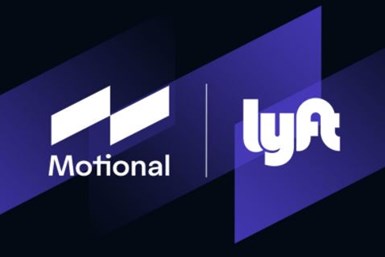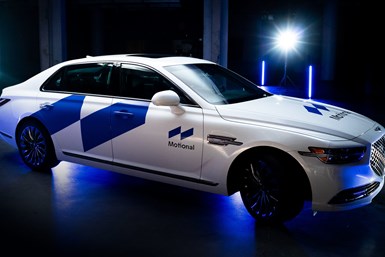Motional, Lyft to Launch Robo-Taxi Service in 2023
Driverless services on tap for several U.S. cities
“Driverless technology is no longer a science project; it’s real technology that’s poised to change how the world moves,” declared Motional CEO Karl Iagnemma last month when the company was approved for testing in Nevada.
Coming Soon

Now the joint venture, which was formed a year ago by Aptiv and Hyundai, is adding some real-world science substance.
In partnership with Lyft, Motional will offer robo-taxi services in several U.S. cities starting in 2023.
Wait, Don’t They Already Do This?
Sort of. Aptiv and Lyft have been testing a fleet of robot-taxis in Las Vegas since early 2018.
But those vehicles are operated with a backup driver, who can seize control if needed.
The new service will be driven fully autonomously—with no driver in sight—while Motional and Lyft monitor from afar.
About the Rollout

Current Motional test car (Image: Motional)
The vehicles will be based on a Hyundai platform, integrated with sensors, computers and software to enable fully driverless operation and remote vehicle assistance. Lyft will power the rideshare network and customer experience.
The program will “significantly” grow the partners’ current AV fleet size, they say, and the service will have the potential to “scale widely.”
Anything Else?
Beyond this, the details are sketchy...as in nothing else is known about the vehicles, fleet size, launch cities, operating parameters (routes, geofencing or who will be able to book the cars).
Both partners’ standard reply to such questions is simply: “Service details will be shared ahead of deployment.”
As far as potential sites, it’s a good bet that Vegas will make the cut. Nevada currently is the only state where Motional has permission to operate without a driver on board.
Why It Matters
While Waymo has been offering driverless autonomous rides for about a year in Arizona, Motional’s partnership with Lyft promises to provide some much-needed critical mass.
“Our aim is to not only build safe, reliable, and accessible driverless vehicles, but to deliver them at significant scale, Iagnemma says. “We’re partnering with Lyft to do exactly that.”
Moreover, it’s another step in the science project to real world applications transition.
RELATED CONTENT
-
on lots of electric trucks. . .Grand Highlander. . .atomically analyzing additive. . .geometric designs. . .Dodge Hornet. . .
EVs slowdown. . .Ram’s latest in electricity. . .the Grand Highlander is. . .additive at the atomic level. . .advanced—and retro—designs. . .the Dodge Hornet. . .Rimac in reverse. . .
-
Robotic Exoskeleton Amplifies Human Strength
The Sarcos Guardian XO Max full-body, all-electric exoskeleton features strength amplification of up to 20 to 1, making 200 pounds—the suit’s upper limit—feel like 10 pounds for the user.
-
Cobots: 14 Things You Need to Know
What jobs do cobots do well? How is a cobot programmed? What’s the ROI? We asked these questions and more to four of the leading suppliers of cobots.








